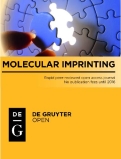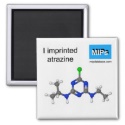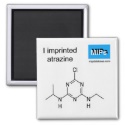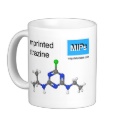|
|
Reference type: Journal
Authors: Li QS, Shen F, Zhang X, Hu YF, Zhang QX, Xu L, Ren XQ
Article Title: One-pot synthesis of phenylphosphonic acid imprinted polymers for tyrosine phosphopeptides recognition in aqueous phase.
Publication date: 2013
Journal: Analytica Chimica Acta
Volume: 795
Page numbers: 82-87.
DOI: 10.1016/j.aca.2013.07.040
Alternative URL: http://www.sciencedirect.com/science/article/pii/S0003267013009860
Abstract: The tyrosine phosphorylation of proteins plays a vital role in signal transduction pathways. The highly selective enrichment of tyrosine phosphopeptides remains a significant challenge in this area of research because of the low levels of tyrosine phosphorylation in cells. Herein, we report the development of a novel molecularly imprinted polymer (MIP)-based method for the recognition of tyrosine phosphopeptides in aqueous media using an epitope approach. Phenylphosphonic acid, which has been regarded the "epitope" of phosphotyrosine, was used as a template, and commercially available zinc acrylate was used as a functional monomer to prepare the MIP. The one-pot synthetic process was simple, efficient, and the resulting MIPs were low-cost, robust, and recyclable. The MIP demonstrated significant higher levels of adsorption capacity and selectivity for phenylphosphonic acid than the non-imprinting polymer (NIP) over its structural analog benzoic acid. The MIP was also used as a molecular receptor to recognize tyrosine phosphopeptides in aqueous media, and showed a clear preference for tyrosine phosphopeptides over interfering serine peptides compared to TiO2. These results revealed the feasibility of the use of MIPs to effectively mimic the epitope approach, and provided a promising alternative to the immunoaffinity techniques commonly used for capturing tyrosine phosphopeptides
Template and target information: phenylphosphonic acid, tyrosine phosphopeptides
Author keywords: epitope approach, molecularly imprinted polymer, Phenylphosphonic acid, Tyrosine phosphopeptides
|


 I imprinted atrazine magnet ball and stick
I imprinted atrazine magnet ball and stick







 I imprinted atrazine magnet
I imprinted atrazine magnet







 atrazine template mug ball and stick
atrazine template mug ball and stick






